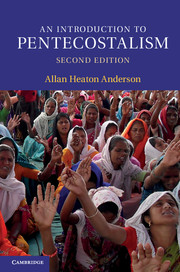Book contents
- Frontmatter
- Contents
- Acknowledgements
- Preface
- Abbreviations
- Chapter 1 Introduction
- Part I History
- Chapter 2 Background and context
- Chapter 3 North America
- Chapter 4 Latin America and the Caribbean
- Chapter 5 Europe
- Chapter 6 Sub-Saharan Africa
- Chapter 7 Asia, Australia and the Pacific
- Chapter 8 Charismatic renewal
- Part II Analysis
- Bibliography
- Index
Chapter 5 - Europe
Published online by Cambridge University Press: 05 June 2014
- Frontmatter
- Contents
- Acknowledgements
- Preface
- Abbreviations
- Chapter 1 Introduction
- Part I History
- Chapter 2 Background and context
- Chapter 3 North America
- Chapter 4 Latin America and the Caribbean
- Chapter 5 Europe
- Chapter 6 Sub-Saharan Africa
- Chapter 7 Asia, Australia and the Pacific
- Chapter 8 Charismatic renewal
- Part II Analysis
- Bibliography
- Index
Summary
The case of ‘secular’ Europe
Europe has a very different and numerically less significant Pentecostalism than Latin and North America. According to one statistician, Portugal was the only country in Europe that had more than 2 per cent of its population ‘Pentecostal’ (denominations) in 2000, and ten European countries had more than 1 per cent. Only three countries (UK, Finland and Norway) had more than 4 per cent of the population ‘Charismatic’, and six countries (UK, France, Italy, Ukraine, Romania and Russia) had Pentecostal populations of more than 400,000. Barrett and Johnson, however, give a rather different picture. Their statistics, which include ‘neocharismatics’, put Russia, UK, Italy and Ukraine respectively in front with over 4 million each, and most countries with much higher numbers of ‘Charismatics’. The actual figures probably lie somewhere in between.
Pentecostalism began in Europe very soon after the Azusa Street revival, but differed from the American movement in several important aspects. Although like its American counterpart it had roots in the Holiness movement, there were stronger influences from the Keswick movement (and its position on sanctification), Pietism in the state churches, and the Welsh Revival. Although it was never an issue in Europe, most European Pentecostals would have identified with a ‘Finished Work’ position in keeping with the influence of Reformed theology on the Pietistic, Keswick and Welsh Revival movements. In contrast to most other parts of the world, the Pentecostal movement in Europe is quite small. David Martin takes issue with the common secularization theories in explaining the ‘exceptionalism’ of Europe and suggests that there are other, equally as important factors. Pentecostalism is less likely to succeed in the developed world because it ‘represents the mobilization of a minority of people at the varied margins of that world, whereas in the developing world it represents the mobilization of large masses’. The USA is the obvious exception to this, and Pentecostalism flourishes there because of its well-established Protestant pluralism and voluntarism and, I would add, its revivalist history. Martin suggests further that in Europe, Pentecostalism does not do as well where there is a strong state church, unless there has been a significant minority of ‘free churches’ like the Baptists, as is the case in Romania and the Ukraine.
- Type
- Chapter
- Information
- An Introduction to PentecostalismGlobal Charismatic Christianity, pp. 92 - 111Publisher: Cambridge University PressPrint publication year: 2013



